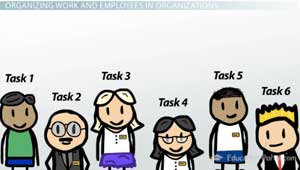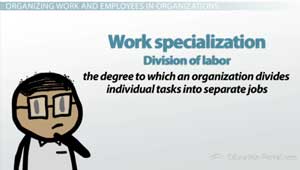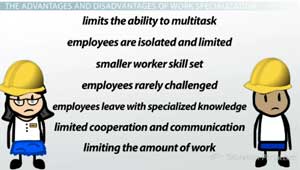Work Specialization in Organizations
After you watch the video and know the material, click HERE for the quiz.
One of the most important decisions an organization will need to make is how to get work done. This lesson will explain the purpose of work specialization in an organization and how it is used to organize separate jobs.
Organizing Work and Employees in Organizations
One of the most important decisions an organization will need to make is how to get work done. Some organizations prefer a team structure, or cross-functional structure, where employees work collaboratively on tasks, often sharing responsibilities and job roles. Other organizations have employees specialize in individual tasks so that the workers become highly proficient in their specialized area.
 |
 |
Work Specialization in Organizations
From the start, all companies must decide on an organizational structure. The organizational structure refers to the type of framework a company uses to distinguish power and authority, roles and responsibilities, and the manner in which information flows through the organization. Having a suitable organizational structure will allow a company to implement proper operating procedures and will aid the organization in accomplishing its goals. For some organizations, specialization is the answer.
If you recall, work specialization, also called a division of labor, allows a manager to take complex tasks and break them down into smaller more precise tasks that individual workers can complete. Each employee is trained explicitly on how to best perform one small, specific task. Over time, that employee becomes extremely proficient and effective at performing that task. This allows every employee in the organization to be an expert to some degree.
Work specialization is particularly beneficial in manufacturing. Think of an assembly line where each individual employee completes one repetitive step in the product development process.
 |
For example, Mary assembles the frame, Bob adds the sides, Erin paints the product, Josh checks that the product is complete, and Jack prepares the product to be shipped. The entire development process is extremely complex and made up of several specialized steps.
When these steps are divided among individual employees, it becomes far less complex. The product is finished and ready to be sold after each employee completes his or her respective task in the product development process. If one employee were responsible for the entire product development process, the results would be far less efficient and extremely time consuming.
The Advantages and Disadvantages of Work Specialization
 |
Advantages of work specialization include:
- Each employee can be an expert to some degree.
- Task refinement by the specialist leads to higher levels of productivity.
- Work can be completed faster and more efficiently due to specialization.
- Quality control costs are lowered due to specialization.
- Gives employees a sense of pride and job security due to their specialized skills.
- All of the previously stated could lead to higher profit potential.
 |
Disadvantages of work specialization include:
- Specialization limits the ability to multi-task.
- Employees are isolated and limited to performing small, repetitive, and, at times, boring tasks.
- Specialized workers have a smaller skill set than employees who are not specialized, making it harder to find work opportunities outside of that job.
- Employees are rarely challenged to do anything more than what they have always done, leading to burn out.
- When an employee leaves the organization, they take their specialized knowledge with them.
- Limited cooperation and communication among employees.
- Co-workers cannot fill in for employees when they are absent, potentially limiting the amount of work that can be done without the specialized employee.
Lesson Summary
Let's review. Work specialization, sometimes called a division of labor, refers to the degree to which an organization divides individual tasks into separate jobs. It allows the manager to take complex tasks and break them down into smaller more precise tasks that individual workers can complete. An assembly line provides a good example for how work specialization is carried out in an organization.
The advantages of work specialization include:
- Employees can be an expert to some degree in their specific task
- Higher levels of productivity
- Lower quality control costs
- Job security for employees due to specialized skills
- Higher profit potential
The disadvantages of work specialization include:
- Limiting the ability to multi-task
- Isolating and limiting employees
- Smaller employee skill sets that can exist only when the employee is working
- Limited cooperation and communication among employees